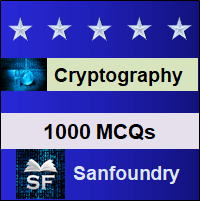
Cryptography and Network Security Multiple Choice Questions Highlights
- 1000+ Multiple Choice Questions & Answers (MCQs) in Cryptography and Network Security with a detailed explanation of every question.- These MCQs cover theoretical concepts, true-false(T/F) statements, fill-in-the-blanks and match the following style statements.
- These MCQs also cover numericals as well as diagram oriented MCQs.
- These MCQs are organized chapterwise and each Chapter is futher organized topicwise.
- Every MCQ set focuses on a specific topic of a given Chapter in Cryptography and Network Security Subject.
Who should Practice Cryptography and Network Security MCQs?
– Students who are preparing for college tests and exams such as mid-term tests and semester tests on Cryptography and Network Security.- Students who are preparing for Online/Offline Tests/Contests in Cryptography and Network Security.
– Students who wish to sharpen their knowledge of Cryptography and Network Security Subject.
- Anyone preparing for Aptitude test in Cryptography and Network Security.
- Anyone preparing for interviews (campus/off-campus interviews, walk-in interview and company interviews).
- Anyone preparing for entrance examinations and other competitive examinations.
- All - Experienced, Freshers and College / School Students.
Cryptography and Network Security Chapters
Here's the list of chapters on the "Cryptography and Network Security" subject covering 100+ topics. You can practice the MCQs chapter by chapter starting from the 1st chapter or you can jump to any chapter of your choice.- Classical Encryption Techniques
- Block Ciphers and the Data Encryption Standard
- Basic Concepts in Number Theory and Finite Fields
- Advanced Encryption Algorithm and Block Cipher Operation
- Pseudorandom Number Generation and Stream Ciphers and More Block Ciphers
- More Number Theory
- Public Key Cryptography and RSA
- Other Public Key Cryptosystems and Cryptographic Hash Functions
- Message Authentication Codes, Whirlpool Algorithm and Key Management and Distribution
- Cryptography Overview, TCP/IP and Communication Networks
- Internet Protocol, Network Addressing and Transport Level Security
- Wireless Network Security and Network Security Overview
1. Classical Encryption Techniques
The section contains multiple choice questions and answers on transportation and substitution techniques, number theory and symmetric cipher models.
|
|
|
2. Block Ciphers and the Data Encryption Standard
The section contains questions and answers on block cipher systems, data encryption standards and their strengths.
|
|
|
3. Basic Concepts in Number Theory and Finite Fields
The section contains MCQs on number theory, group rings, fields, modular arithmetic and polynomial theory.
|
|
|
4. Advanced Encryption Algorithm and Block Cipher Operation
The section contains multiple choice questions and answers on AES algorithms, DES operation modes and triple DES methods.
|
|
|
5. Pseudorandom Number Generation and Stream Ciphers and More Block Ciphers
The section contains questions and answers on PRNG principles, pseudorandom number generators, blowfish algorithm and RC4 and RC5 algorithms.
6. More Number Theory
The section contains MCQs on number theory concepts and its applications.
|
|
|
7. Public Key Cryptography and RSA
The section contains multiple choice questions and answers on rabin/elgamal algorithms, knapsack/merkle cryptosystem algorithms and their applications.
|
|
|
8. Other Public Key Cryptosystems and Cryptographic Hash Functions
The section contains questions and answers on elliptic curve arithmetic and cryptographic algorithms, hash functions, its applications and secure hash algorithms.
9. Message Authentication Codes, Whirlpool Algorithm and Key Management and Distribution
The section contains MCQs on message authentication codes, CGM, GCM, HMAC, DAA, whirlpool algorithms and other key management, wrapping and distribution algorithms.
10. Cryptography Overview, TCP/IP and Communication Networks
The section contains multiple choice questions and answers on cryptography overviews, network hardware and topologies, layers and TCP/IP and OSI reference models.
|
|
|
11. Internet Protocol, Network Addressing and Transport Level Security
This section contains questions and answers on IP addressing and datagram packets, classful and classless addressing, subnet design and secure socket layer.
12. Wireless Network Security and Network Security Overview
The section contains MCQs on wireless security, IEEE WLAN security and its overview.
|
|
|
Wish you the best in your endeavor to learn and master Cryptography and Network Security!
